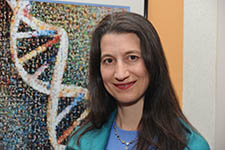Announcements
DOES YOUR RESEARCH TEAM NEED VOLUNTEERS FOR COMMON AND RARE CONDITIONS STUDIED AT NIH?
The NIH Clinical Center’s Office of Patient Recruitment (OPR) can help you locate and screen volunteers for your research studies through numerous channels. OPR will distribute eye-catching print announcements, deliver messages through social media and LISTSERVs, and place paid advertisements and notifications if your study has a recruiting budget. OPR can provide lists of research volunteers interested in hearing about study opportunities. OPR’s recruitment specialists can guide you with using external resources such as ResearchMatch, a database of almost 150,000 research volunteers. For more information, visit OPR’s website, call 301-402-6380, or email PRPL@cc.nih.gov. Let the NIH Clinical Center Office of Patient Recruitment help you!
NEW URL FOR CREx WEBSITE
The website for the NIH Collaborative Research Exchange (CREx) has changed to https://crex.nih.gov (before it was https://nih.scientist.com). Log in to CREx today and start exploring innovative technologies and advanced expertise to accelerate your research. CREx is an online research marketplace where NIH scientists can share capabilities, increase innovation, and reduce costs by: identifying capabilities of over 200 NIH core laboratories and collaborative facilities; exploring capabilities of thousands of external biotechnology partners; allowing Core experts to share their innovative technologies; encouraging inter-institute collaborations through sharing of technical knowledge and expertise
All NIH researchers can sign up for CREx at crex.nih.gov with their NIH login credentials and experience these benefits:
- Research services easily identified using keywords;
- Prepopulated lists of NIH cores and outside vendors help investigators identify appropriate facilities;
- Vendors and cores are “badged” to reflect certifications;
- Once vendors of interest have been identified, the platform enables communication through the investigator’s private dashboard to: Keep track of requests; share information with lab colleagues by adding them as followers; obtain quotes/proposals from multiple vendors and Cores; and send quotes/proposals directly to NIH Procurement systems such as POTS, AMBIS
TECHNOLOGY TRANSFER, INVENTION DEVELOPMENT, AND COMMERCIALIZATION TRAINING FOR POSTDOCS
- Applications NOW being accepted
- Application deadline to apply for 2021: December 1, 2020
- To apply and for more information go to the following website or watch this informational session
- Technology Transfer Ambassadors Program (TTAP) - https://techtransfer.cancer.gov/aboutttc/ambassadors
The Technology Transfer Ambassadors Program (TTAP) is a free, virtual, training opportunity for postdocs seeking to enhance their current research activities with hands-on experience in biomedical invention development, commercialization, and entrepreneurship. Postdocs from 20 NIH Institutes/Center (listed on the website) are eligible to apply. To find out more, visit the website or contact TTAP.
TRANSITION TO INDUSTRY FELLOWSHIP FOR NCI-CCR POSTDOCS
- Applications NOW being accepted
- Deadline to apply for the 2021-2023 fellowship: December 1, 2020
- To apply and for more information go to the following website or watch this informational session (*T2I starts at 22:30*):
- Transition to Industry Fellowship (T2I) for NCI-CCR postdocs: https://techtransfer.cancer.gov/transition-industry-fellowship-t2i
The NCI Transition to Industry Fellowship (T2I) is a two-year, paid fellowship supporting NCI Center for Cancer Research (CCR) postdocs as they advance an invention toward a regulatory milestone, clinical trials, and subsequent commercialization. T2I fellows will spend 80% of their time in the lab focused on invention development research, moving a basic science research invention from the “bench to commercialization.” In the remaining 20% of their time, trainees will take courses in business development, entrepreneurship, and small business grantsmanship. Postdocs from the NCI-CCR are eligible to apply – they must also be either an inventor on a patent/patent application or working on a project for which a patent/patent application has been filed. To find out more, visit the website or eamil T2I_Fellowship@mail.nih.gov.
MANDATORY ONLINE ANTI-HARASSMENT TRAINING
- Deadline for new hires: Within 90 days of onboarding
- Annual deadline for others: December 14
The NIH is committed to achieving a harassment-free work environment. As part of our continued commitment, the agency launched the 2020 Anti-Harassment training on September 14. The goals of the training are to educate individuals in the workplace to prevent harassment; raise awareness of what constitutes harassment and the consequences of harassing behavior; stamp out instances where harassing behavior may exist. The Anti-Harassment training is mandatory and replaces the No FEAR and Prevention of Sexual Harassment (POSH) training. All NIH federal employees, trainees, fellows and contractors are required to take the Anti-harassment training annually. The 2020 training must be completed by December 14. Failure to comply with the training requirement—that is, taking the training within 90 days of onboarding and annually thereafter—will result in the disablement of a person’s active directory accounts until the requirement is met. Anyone whose active directory account is disabled will be unable to sign into their computer or access emails. To learn more about EEO mandatory training for the NIH, visit the Office of Equity, Diversity, and Inclusion website at https://www.edi.nih.gov/training/mandatory-training.
PANDEMIC PERSPECTIVES: STORIES THROUGH COLLECTIONS
- Smithsonian's National Museum of American History
- Tuesday Colloquium
- Join Via Zoom 4:00-5:00 p.m.
- Information and to register: https://americanhistory.si.edu/pandemic-perspectives
Join curators and historians for an engaging series of panel discussions offering perspectives on the current pandemic. Panelists will virtually share objects from the past as a springboard to a lively discussion of how to better understand the present. Audience questions are encouraged and will be addressed in the moderated dialogue.
- November 3, 2020: Voting During a Pandemic
- November 24, 2020: Comfort Food During a Pandemic
- December 1, 2020: How Are Museums Collecting Around COVID-19?
- December 15, 2020: Looking Good on that Zoom Call: Personal Appearance During a Quarantine
- January 5, 2021: Racing for Vaccines
- January 19, 2021: Mask Up!
- February 2, 2021: Race and Place: Yellow Fever and the Free African Society in Philadelphia
- February 16, 2021: Essential Workers: Prestige Versus Pay
“HUMAN MICROBIOME: FRIEND AND FOE”
- Anita B. Roberts Lecture
- Speaker: Julie Segre, Ph.D.
- Tuesday, November 3, 12:30-2:00 p.m.
- Videocast (and archived): https://videocast.nih.gov/watch=37780

Senior Investigator and Chief of the Translational and Functional Genomics Branch Julie Segre (National Human Genome Research Institute) will be the featured speaker at the 2020 Anita B. Roberts Lecture. Segre’s research integrates high-throughput sequencing, algorithm development, and clinical studies to explore the microbe diversity of human skin in both healthy and disease states. Her team established the first topographical maps of human skin bacterial and fungal diversity, enabling the study of alternations in those populations that are associated with eczema and other microbial-associated infections. Segre’s laboratory also integrates genomic tools to track hospital-acquired infections, model outbreaks, monitor evolution of antibiotic resistance, and develop risk assessment strategies. She is a fellow of the American Academy of Microbiology and the National Academy of Medicine, and she received the Service to America Medal in 2013. She is also an outstanding mentor and currently serves as a member of the NIH Women Scientists Advisors Executive Committee.
The “Anita B. Roberts Lecture Series: Distinguished Women Scientists at NIH” is sponsored by the Women Scientists Advisors Committee and honors the research contributions Roberts and other female scientists have made. Roberts, who spent 30 years at NCI before her death in 2006, was known for her groundbreaking work on transforming growth factor–beta. The lecture will be presented virtually and can be viewed by logging onto the website listed above. To arrange sign-language interpretation, please contact Joy Jackson Farrar or Dee Andrews at jacksjoy@ors.od.nih.gov or dandrews@od.nih.gov.
NIH SUMMIT ON STATE OF SARS-COV-2 ANTIVIRAL THERAPEUTICS DEVELOPMENT
- Friday, November 6, 2020; 11:00 a.m.-3:30 p.m.
- Videocast and archived: https://videocast.nih.gov/watch=38975
- Agenda: click here
- Registration is not required.
NIH is hosting the Virtual SARS-CoV-2 Antiviral Therapeutics Summit to discuss progress and remaining challenges in developing antiviral treatments for COVID-19. Experts from academia, industry, NIH, and other parts of the federal government will discuss such topics as SARS-CoV-2 targets for drug development and tools to test promising antiviral drug candidates. They also will identify unmet research needs, share lessons learned from other infectious diseases, and explore opportunities for public-private partnerships. The meeting is sponsored by NIH's National Center for Advancing Translational Sciences and National Institute of Allergy and Infectious Diseases.
Agenda
Hosts and Opening Speakers:
- Francis S. Collins, M.D., Ph.D., Director, National Institutes of Health
- Anthony S. Fauci, M.D., Director, National Institute of Allergy and Infectious Diseases
- Christopher P. Austin, M.D., Director, National Center for Advancing Translational Sciences
Panel Moderators and Speakers:
- Annaliesa Anderson, Ph.D., Vice President and Chief Scientific Officer, Bacterial Vaccines, Chief Scientific Officer, The Hospitals Business Unit, Pfizer
- Kara Carter, Ph.D., Executive Vice President of Infectious Disease, Evotec
- Tomas Cihlar, Ph.D., Vice President of Virology, Gilead Sciences
- Kizzmekia Corbett, Ph.D., Research Fellow, Vaccine Research Center, National Institute of Allergy and Infectious Diseases
- Mark Denison, M.D., Stahlman Professor of Pediatrics, Director of the Division of Pediatric Infectious Diseases, Vanderbilt University Medical Center
- Daria Hazuda, Ph.D., Vice President of Infectious Disease and Vaccines, Chief Scientific Officer of the Exploratory Science Center, Merck & Co., Inc.
- Pei-Yong Shi, Ph.D., John Sealy Distinguished Chair in Innovations in Molecular Biology, University of Texas Medical Branch
- Richard Whitley, M.D., Distinguished Professor of Pediatrics, Vice Chairman of the Department of Pediatrics and Co-Division Director of Pediatric Infectious Diseases, University of Alabama at Birmingham
“RETHINKING GENERAL ANESTHESIA”
- DeWitt Stetten Jr. Lecture (part of the WALS lecture series)
- Wednesday, November 18, 2020, 3:00-4:00 p.m. ET
- Videocast and archived: https://videocast.nih.gov/watch=40044
- Website: https://www.nigms.nih.gov/News/meetings/Pages/2020-stetten-lecture-rethinking-general-anesthesia.aspx

Featured speaker Emery N. Brown, M.D., Ph.D., will discuss his research on general anesthesia at the 2020 DeWitt Stetten Jr. Lecture. Brown is an anesthesiologist at the Harvard Medical School Massachusetts General Hospital (MGH) and a statistician whose work has helped explain how anesthetic drugs act in the brain. His discoveries have led to new ways of monitoring patients’ brain states during general anesthesia, as well as strategies for drug dosing and precisely controlling the anesthetic state. Brown has also developed signal processing algorithms and statistical methods that characterize the dynamic properties of neuroscience data. He is the Warren M. Zapol Professor of Anaesthesia at Harvard Medical School and MGH and the Edward Hood Taplin Professor of Medical Engineering and of Computational Neuroscience at Massachusetts Institute of Technology.
NIGMS established the annual DeWitt Stetten Jr. Lecture series in 1982 in honor of the third director of the Institute, DeWitt Stetten Jr., M.D., Ph.D. The lecture is open to all who are interested. People who require sign language interpretation or other reasonable accommodation to participate in this event should contact the WALS Office at WALSoffice@od.nih.gov (or the Federal Relay, 800-877-833) five days before the lecture.
2020 NIH DIRECTOR’S AWARDS
- Submission dates: Approximately November 16, 2020-February 14, 2021
- To nominate someone go to: e-HARTS
An NIH Director’s Award is the most prestigious non-monetary award at NIH to recognize the greatest achievements of all institutes, centers, and offices (ICs). Each nomination undergoes a rigorous review process which includes each IC Director, the NIH Awards Review Committee, and a selection by the NIH Director for special recognition. Historically, the in-person NIH Director’s Awards Ceremony provided an opportunity to showcase stellar service in the areas of research, administration, technical and clerical support, mentorship, clinical care, Commissioned Corps, work/life and well-being, and equity, diversity, and inclusion. This year we are pleased to highlight the remarkable accomplishments of 660 NIH staff from the 2019 calendar year in a virtual format. The virtual awards site was developed in partnership with IC leadership across NIH to recognize their incredible accomplishments.
Contact the NIH Awards Team for more information on the NIH Director’s Awards nomination process. Nominations can be submitted by any NIH employee with familiarity of the work performed either by an individual or group. Nominations for the 2021 NIH
ADVANCING THE HEALTH OF WOMEN THROUGH SCIENCE
- ORWH’s 30th Anniversary Virtual Meeting Series
- December 14–16, 2020
- To register go to: https://orwh.od.nih.gov/about/newsroom/events

The NIH Office of Research on Women’s Health (ORWH) is hosting three enlightening virtual meetings to celebrate 30 years of women’s health research and sex and gender studies within and beyond the NIH scientific community. These meetings, ORWH’s 30th Anniversary Virtual Meeting Series: Advancing the Health of Women Through Science, will be held December 14–16 and will convene researchers on the health of women and sex differences as well as members of two signature ORWH programs: Building Interdisciplinary Research Careers in Women’s Health (BIRCWH; pronounced “BIRCH”) and Specialized Centers of Research Excellence (SCORE) on Sex Differences.
BIRCWH Annual Meeting December 14, 10:00 a.m.–5:00 p.m. (virtual only): Celebrating its 20th anniversary, BIRCWH is a mentored career-development program connecting junior faculty, known as BIRCWH Scholars, to senior faculty with shared interests in women’s health and sex differences research. The annual meeting brings BIRCWH Scholars and faculty together to share research and experiences. The 4th annual Ruth L. Kirschstein Memorial Lectureship will focus on the importance of and improvements made in mentoring young investigators. The plenary session will also include presentations on research findings by leading BIRCWH Scholars. A special “Innovation Talk” to celebrate the 20th anniversary of the BIRCWH program will close the session.
ORWH 30th Anniversary Scientific Symposium, December 15, 9:30 a.m.–5:30 p.m. (virtual only): This symposium will feature opening remarks by NIH Director Francis Collins, M.D., Ph.D., a keynote address on women’s mental health across the life course, and a panel of directors from several NIH ICs discussing their perspectives on women’s health. Additional presentations will discuss high-priority women’s health topics, such as applying the principle of studying sex as a biological variable across scientific disciplines. Program details will be posted here as they are finalized. ]
SCORE Annual Meeting Keynote Address, December 16, 10:40 a.m.–11:30 a.m. (virtual only): A signature program of ORWH, SCORE is the only NIH cooperative program supporting disease-agnostic research on sex differences. Each center in the SCORE program serves as a national resource for translational research, at multiple levels of analysis, to identify the role of biological sex differences on the health of women. At this year’s SCORE Annual Meeting, Jocalyn Clark, Ph.D., executive editor of The Lancet, will present the keynote address: “Sex Differences Research and the Health of Women: An Editor’s Perspective.” Note that only the keynote address is open to the public; the remainder of the event is a business meeting of SCORE investigators.
All times Eastern Standard Time (EST). Schedules and program details are subject to change. More information is available here.
2021 DEMYSTIFYING MEDICINE
- Tuesdays, January 12–May 11, 2021, 4:00–6:00 p.m.
- Videocast live and archived online at https://videocast.nih.gov/default.asp
- (All presentations will be held online until further notice)
- To sign up and for more information, go to https://demystifyingmedicine.od.nih.gov.

The NIH- and FAES-sponsored course “Demystifying Medicine” is designed to excite the interest of Ph.D. and M.D. students, fellows, researchers, and others in bridging the gap between amazing advances in basic science and the challenges of clinical disease. There are no formal requirements to attend as many of the weekly sessions as desired. The format involves a translational physician, a basic scientist, and usually a live patient who puts a human face on the disease.
January 12: COVID-19 and Influenza; Anthony Fauci, (NIAID), Jeffrey Taubenberger (NIAID)
January 19: COVID-19 Immunology and Vaccines; Luigi Notarangelo (NIAID), Barney Graham (NIAID)
January 26: Bone Marrow-Based Therapies Today and Tomorrow; Cynthia Dunbar (NHLBI); Harry Malech (NIAID)
February 2: Viruses and Immunodeficiency; Phillip Murphy (NIAID), Heidi Kong (NIAMS)
February 9: Multiple Sclerosis: Advances in Pathogenesis and Treatment; Bibiana Bielekova (NINDS), Alison Wichman (NINDS)
February 16: Role of Microbiome in Nutrition, Inflammation and Cancer; Yasmine Belkaid (NIAID), Giorgio Trinchieri (NCI)
February 23: Biomedical Challenges in Space: Human Biology, International Space Station and Beyond; Mark Shelhamer (Johns Hopkins/NASA), Christopher Wanjek, Science and Health Writer
March 2: RNA Viruses: How They Do What They Do; Nihal Altan Bonnet (NHLBI); Karla Kirkegaard (Stanford Genetics)
March 9: Ethics in vaccine development, testing and use; Christine Grady (NIH Clinical Center); (pending) Making a Covid19 Vaccine; Kizzmekia Corbett (NIAID)
March 16: How COVID-19, HIV and Other RNA Viruses Affect One Another (tentative); John Coffin (Tufts University) and colleague
March 23: Diversity and Disease in the Genomic Era; Gary Gibbons (NHLBI), Anne Summer (NIDDK)
March 30: Autophagy: Mechanisms and Neurodegenerative Diseases; Ana Marie Cuervo (Albert Einstein College of Medicine), Michael Ward (NINDS)
April 6: How COVID-19 Pandemic Changes Medical Research, Teaching, and Patient Care; Ezekiel Emmanuel (University of Pennsylvania)
April 13: Suicide and Depression in Time of COVID-19; Nora Volkov (NIDA), Carlos Zarate (NIMH)
April 20: Traumatic Brain Injury; David Brody (USUHS), Brad Dengler (USUHS)
April 27: Parkinson Disease: Advances and Challenges; Michael D. Fox (Harvard), Ellen Sidranski (NHGRI)
May 4: Reporting Science to Public; Stephen Smith (Health and Science Editor, Washington Post); How “Science” Adapts to the Pandemic; Valda Vinson (Editor, Science)
May 11: FINALE…. (on hold) COVID-19, NIH and the Year that Was; NIH Director Francis Collins
This page was last updated on Monday, March 21, 2022
